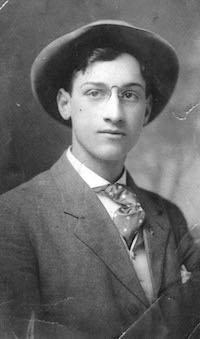HOME
TOPICS
ABOUT ME
I learned a lot in my later life from my dad. But I learned something else, as a kid not even yet in school, from my grandfather. I learned to be curious.
Starting our fourth decade: Al Fasoldt's reviews and commentaries, continuously online for 31 years

This is my grandfather, Dudley, the last Fasoldt clockmaker. He encouraged my curiosity, and the lifelong lesson he taught carried me into technology journalism.
A day for grandfathers, too
June 15, 2014
By Al Fasoldt
Copyright © 2014, Al Fasoldt
Copyright © 2014, The Post-Standard
Father's Day is celebrated today in 75 countries around the world. In my personal world, it's a day I like to think of my father's father.
My dad was a rebel, like so many other kids growing up in the early years of the 20th Century. He refused to go along with his father's wishes to carry on the family business.
And so my dad became a salesman. That left my grandfather as the last of his kind -- a clockmaker. An honest-to-goodness clockmaker, from a family of clockmakers that went far back into Germany.
I learned a lot in my later life from my dad. But I learned something else, as a kid not even yet in school, from my grandfather. I learned to be curious.
Little things fathers and grandfathers do can change the life of a child forever. In my case, this change sprang from necessity: My mom needed someone to look after little Allen, barely four years old, during the school day. My grandmother volunteered, and my grandfather came up with a way I could be watched while he worked in his clockmaker's shop.
He sat me on a stool every day I was there, right in front of his big workbench. He told me stories -- he had a great sense of humor and a funny way of making a "buh-buh-buh" sound when he sensed my attention was flagging -- and he encouraged me to ask questions about anything he was doing.
Naturally, that meant I was usually asking questions about clocks -- what made the hands move, what the pendulum did, why you had to stop winding just before the weight hit the stop. Sometimes I just asked about which shiny parts went where.
My grandfather made everything that went into the clock -- the brass wheels with teeth in them, the heavy weights, even the wood cases. He took me with him when he went out into the forest to look for cherry trees, the perfect wood for clock cases.
Most of all, he showed me how clocks worked. He treated me as if I were a sort of small grownup. He never talked down to me, never told me I was "too young to understand."
And so my grandfather granted me two things: A love of clocks, the old-fashioned kind, with pulleys and tick-tocks you could hear in the next room. And an abiding curiosity: Since those days in his shop, I've always wanted to know how things worked.
As a journalist, I turned that fascination into explanations of why computers and software do what they do -- and, perhaps even more importantly, why they fail at that task. I haven't been afraid of opening up the innards and looking for the bent spring or the wobbling pendulum.
And so I dedicate this day to Dudley F. Fasoldt, son of a clockmaker, grandson of a clockmaker. And grandfather of a little boy who fell in love with the mysteries of how things work. Rest in peace, my mentor.